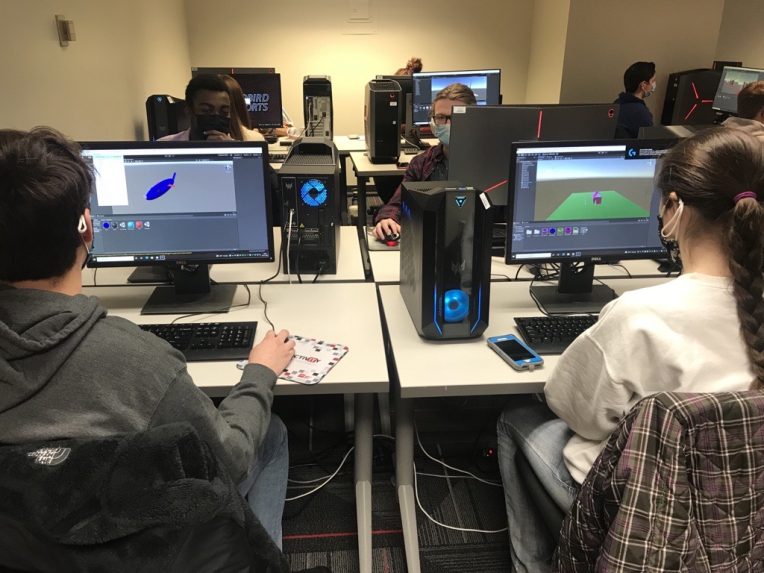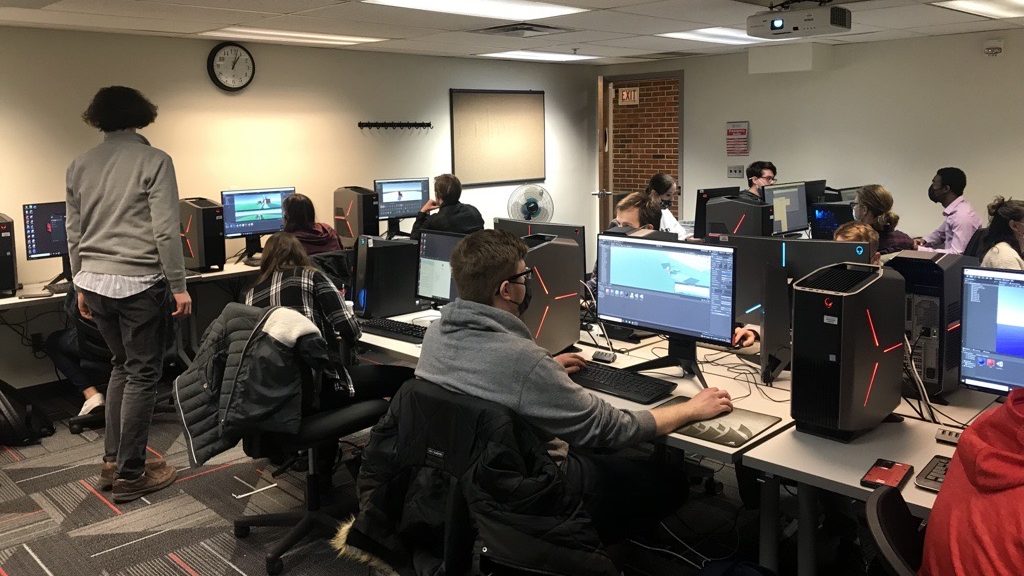Late in December of 2021, Dr. Roy Magnuson, associate professor of music composition and creative technology in the Wonsook Kim College of Fine Arts, reached out to Craig Jackson, director of Infrastructure Operations and Networking in the Office of Technology Solutions, about a class he was planning to teach during the first half of the spring 2022 semester. The class, titled “Exploring Creativity through Game (World) Design and Virtual Reality in the Unity Game Engine,” was one of the Honors Exploration options for the semester. Honor Explorations are noncredit, five-week learning experiences that are open to 25 Honors students from a variety of majors and years in school. The class aimed to have each student build a working VR simulation from scratch in just five weeks.
Magnuson had taught a similar version of the class before, based out of Milner Library, and had students working on their personal laptops. He had to get them access to Unity software on their personal devices, which could be inconvenient at times. For this class, he decided to reach out to Tech Solutions, who he had partnered with on prior projects, to see if there were options that might benefit his students and their class—would they have a space available with 18 devices?
Jackson brought the idea to his Tech Solutions colleagues, who first considered the Digital Innovation, Graphics, and Gaming Studio (DIGGS) space. This was ultimately passed up in favor of 113 Julian Hall—it had the space, the most machines, and had enough horsepower for all the students to utilize the Unity program simultaneously. It wasn’t until Magnuson began teaching in the room that he realized how amazing it was to have that kind of infrastructure built into the space. He said it “completely transformed what the class is pedagogically.” All of the students could grab files online or build within the program without having to accommodate delays or overloads to the system. The room also had room for demo space (integral for virtual reality) and an instructor’s station and was a flexible space that could be set up with input from Magnuson. Kevin Hand, interim executive director of Business Administration and Communications in Tech Solutions, shared: “We were able to adapt pedagogy with technology in a visible way with this project. You walk in and it all works.”
Another boon was having Endpoint Support, an area of Tech Solutions, close by for backup. Endpoint assisted in everything from testing out the machines before the students started class to making sure all the software was up-to-date to stepping in when audio wasn’t working. According to Richie Szaflarski, manager of Endpoint Support, the biggest challenge was finding an additional six computers that fit the technological needs of Magnuson’s class before the start of the semester. The space had 12 Alienware Aurora R7 desktops, which “are more powerful than our average customer’s workstation.” But there would be 18 students participating in the class. Thankfully, they were able to acquire six Acer Predator Orion 3000 desktops on loan from a partner company just in time!
The students had positive feedback for their experience in this class and not only completed their VR experience by the end of the five weeks, but also pushed themselves to try side projects or dream up ways this could be used in the future. Magnuson shared that students exploring on their own created bowling alleys and even a parkour course.
Junior acting major, Katie Friemann, added: “As a theatre major who focuses on performance, I don’t often get to work with technology or the technological side of things. I learned that the possibilities of game design and VR are endless if you have the time, creativity, and patience. In the future, I want to explore creating an interactive gallery of sorts for artists like me to showcase and get community feedback on monologues, songs, visual art, and other art forms. I’d love to bring VR technology into the world of theatre and entertainment, and this Exploration helped show me that that crossover is much easier and more realistic than I ever imagined.”
All in all, this partnership between Dr. Magnuson and Tech Solutions is viewed as a pilot for future opportunities between the academic and technology areas of the University. The hope is to come up with a template for the reservation of this and similar spaces and to train students on newer technologies, so they can be involved in enabling their peers’ access to spaces and resources. Magnuson stressed how “profoundly thankful myself and Honors are for this opportunity. It was so crazy to be allowed this space and these machines with all the installations and hand-cut wires ready for our class. It was awesome. It also allowed the students to see in real time the value added to their experience.”
“When approached with an innovative idea, we’re here to try our best to say ‘yes,’” says Hand. Magnuson is already using the space for a graduate-level class this fall, and Technology Solutions has already improved and expanded the available equipment due to a new partnership with Lenovo. Twelve Lenovo Legion machines are being installed in the suite for the next round of innovative endeavors. The department is open to hearing from other faculty and staff how our campus spaces can be utilized or even transformed to meet students’ needs and become the computer labs of the future.


